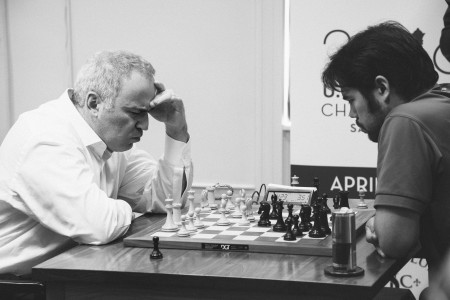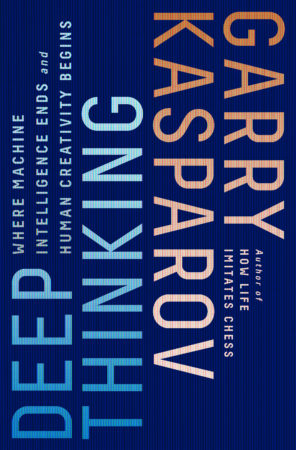

READ ORIGINAL ARTICLE AT THE NEW SCIENTIST
Two decades after his devastating loss to a supercomputer, chess legend Garry Kasparov is embracing his old adversary
By Sean O’Neill
 HE WAS fiery, flamboyant and merciless, and people loved him for it. It was 1985 when Garry Kasparov became the youngest ever world chess champion at just 22. He remained at the top for 20 years, but it was his epic battles with IBM’s supercomputer Deep Blue in 1996 and 1997 that catapulted him into the stratosphere. Billed as the ultimate Human vs Machine challenge, the first six-game match began badly for Kasparov, but he fought back to win 4-2. But in the second game of the rematch a year later, a flustered Kasparov needlessly resigned when he could have forced a draw. He never recovered psychologically and lost 2½ to 3½. It has taken Kasparov 20 years to get over his defeat – and to embrace his former adversary, artificial intelligence.
HE WAS fiery, flamboyant and merciless, and people loved him for it. It was 1985 when Garry Kasparov became the youngest ever world chess champion at just 22. He remained at the top for 20 years, but it was his epic battles with IBM’s supercomputer Deep Blue in 1996 and 1997 that catapulted him into the stratosphere. Billed as the ultimate Human vs Machine challenge, the first six-game match began badly for Kasparov, but he fought back to win 4-2. But in the second game of the rematch a year later, a flustered Kasparov needlessly resigned when he could have forced a draw. He never recovered psychologically and lost 2½ to 3½. It has taken Kasparov 20 years to get over his defeat – and to embrace his former adversary, artificial intelligence.
You’ve have just published a book in which you explore your defeat by Deep Blue. Was writing it a cathartic experience?
Yes, absolutely. There were many questions about my rematch with Deep Blue that I had avoided asking and the answers weren’t always pleasant. Even though it was 20 years ago, writing about it was a very painful experience. I’d never analysed those six games in depth using modern chess computers. I discovered that Deep Blue didn’t play very well either – at least not as well as we all believed at the time – and this made me feel even worse about how my terrible psychological state during the match led to my loss. Of course, it was only a matter of time before Deep Blue or another machine defeated me, but I played embarrassingly below my level.
If you could go back in time and take the draw in the second game of the rematch, would you?
Once a move is made it cannot be retracted, and if I had a time machine, I’m sure I could think of better uses for it. That match was such an anomaly, it has taken years for me to even attempt to draw lessons from it.
What are the broader lessons from your defeat?
As the proverbial man in man-versus-machine I feel obligated to defend humanity’s honour, but I’m also a realist. History has spoken: for nearly any discrete task, including playing chess, machines will inevitably outstrip even human-plus-machine. AI is hitting us in a huge wave, so it is time to embrace it and to stop trying to hold on to a dying status quo.
What did you make of the Go match between DeepMind’s AlphaGo and top player Lee Sedol?
I understand that AlphaGo played some genuinely unusual moves, strong moves that a top human would never consider. It doesn’t surprise me that there is room for this in a game as long and subtle as Go, where an individual move is worth less than in chess. It’s even possible that entirely new ways of playing Go will be discovered as the machine gets stronger. It’s also likely that humans won’t be able to imitate these new strategies, since they depend on the machine’s unique capabilities.
You called Deep Blue the end and AlphaGo the beginning. What did you mean?
Chess was considered a perfect test bed for cognition research but it turned out the world chess champion could be beaten while barely scratching the surface of artificial intelligence. I’m sure some things were learned about parallel processing and the other technologies Deep Blue used, but the real science was known by the time of the 1997 rematch. Not to downplay the Deep Blue team’s achievement, but AlphaGo is an entirely different thing. Deep Blue’s chess algorithms were good for playing chess very well. The machine-learning methods AlphaGo uses are applicable to practically anything.
What does that mean for the wider world?
AI is clearly booming as a technology, but there’s no way to know what part of the curve we are in. Periods of rapid change are turbulent and confusing, and we are seeing the social apprehension that comes with a wave of automation, even more so because robots and algorithms are moving in on jobs that require college degrees. Of course, real dangers and human anguish come with the AI wave, and we can’t be callous toward those caught in the turbulence. But it’s easy to focus on the negative things because we see their impact much more clearly, while the new jobs and industries of the future can’t be imagined so easily. I think we’ll be surprised, as we have been throughout history, by the bright future that all these amazing tools will help us build, and how many new positive trends appear.
Computer scientist Larry Tesler once said “intelligence is whatever machines haven’t done yet”. Where are the next targets?
Where aren’t they? The biggest public impact might be felt in medical diagnosis. This is an area that doesn’t require 100 per cent or even 99.99 per cent accuracy to be an improvement on human results. You wouldn’t trust a self-driving car if it was only 99 per cent accurate. But human doctors are only 60 or 70 per cent accurate in diagnosing many things, so machine or human-plus-machine hitting 90 or 99 per cent will be a huge improvement. As soon as this is standard and successful, people will say it’s just a fancy tool, not AI at all, as Tesler predicted.
“The world champion could be beaten while barely scratching AI’s surface”
What happens if AI, high-tech surveillance, military tech, and communications are sewn up by the ruling class?
Ruling class? Sounds like Soviet propaganda! New tech is always expensive and employed by the wealthy and powerful even as it provides benefits and trickles down into every part of society. But it seems fanciful – or dystopian – to think there will be a harmful monopoly. AI isn’t a nuclear weapon that can or should be under lock and key; it’s a million different things that will be an important part of both new and existing technology. Like the internet, created by the US military, AI won’t be kept in a box. It’s already out.
Will handing off ever more decisions to AI result in intellectual stagnation?
Technology doesn’t cause intellectual stagnation, but it enables new forms of it if we are complacent. Technology empowers intellectual enrichment and our ability to indulge and act on our curiosity. With a smartphone, for example, you have the sum total of human knowledge in your pocket and can reach practically any person on the planet. What will you do with that incredible power? Entertain yourself or change the world?
“Deep Thinking: Where machine intelligence ends and human creativity begins” by Garry Kasparov is published by Hodder & Stoughton
This article appeared in print under the headline “Endgame? It’s just the beginning”


